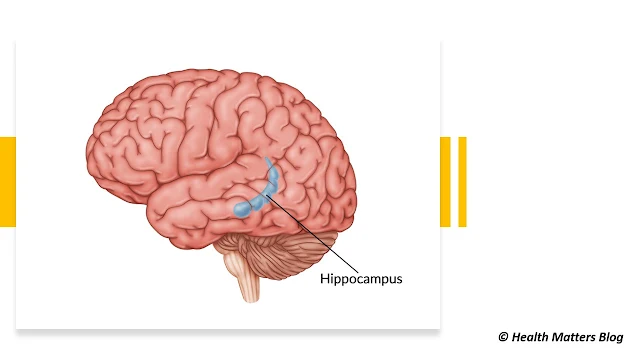The hippocampus of the brain
The hippocampus is a part in the brain that lies within the white matter of the temporal lobe. It's a part of the limbic system. It's called so because it's anatomically similar to seahoarse (hippocampus means seahoarse).
Anatomy:
The hippocampus is a small, curved structure located in the medial temporal lobe of the brain. It is considered one of the most important structures for learning and memory, as well as for spatial navigation.
The hippocampus is divided into three main parts:
1-Dentate gyrus: This is the outermost layer of the hippocampus and is characterized by its folded appearance. It contains granule cells, which receive inputs from the entorhinal cortex, and mossy cells, which send axons to the CA3 region.
2-CA fields: The CA fields (CA1, CA2, and CA3) are the main regions of the hippocampus involved in learning and memory. The CA3 region receives input from the dentate gyrus, while the CA1 region sends output to the entorhinal cortex.
3-Subiculum: The subiculum is a thin layer of cells that lies beneath the CA fields. It receives input from the CA1 region and sends output to various other regions of the brain, including the entorhinal cortex and the prefrontal cortex.
The hippocampus receives input from various regions of the brain, including the entorhinal cortex, which sends information about spatial context and memory, and the amygdala, which is involved in emotional processing. The hippocampus then sends output to various other regions of the brain, including the prefrontal cortex, which is involved in decision-making and executive function.
Functions of the hippocampus:
The hippocampus is a region of the brain that is crucially involved in a variety of cognitive functions, including learning, memory, and spatial navigation. Below are some of the key functions of the hippocampus:
1-Formation of new memories: The hippocampus plays a critical role in the formation of new memories, including declarative memories (memories of facts and events) and spatial memories (memories of locations and environments).
2-Consolidation of memories: After memories are initially formed, the hippocampus is involved in the consolidation process, in which memories are stabilized and transferred to other regions of the brain for long-term storage.
3-Spatial navigation: The hippocampus is essential for spatial navigation, including the ability to navigate through complex environments, create cognitive maps of new environments, and use spatial cues to navigate.
4-Contextual learning: The hippocampus is involved in contextual learning, which is the process of learning and storing information about the context in which an event occurs.
5-Emotion and motivation: The hippocampus is also involved in emotion and motivation, including the processing of emotional stimuli and the regulation of stress responses.
6-Neuroplasticity: The hippocampus is a highly plastic region of the brain, meaning that it has the ability to change and adapt in response to experience and environmental stimuli.
Impact of hippocampal damage:
Damage to the hippocampus can have profound effects on cognitive function, including memory, spatial navigation, and contextual learning. Below are some of the effects of hippocampal damage:
1-Anterograde amnesia: The most prominent effect of hippocampal damage is anterograde amnesia, which is the inability to form new memories after the damage occurs. Patients with hippocampal damage may still remember events from their past (retrograde amnesia), but they are unable to create new memories for events that occur after the injury.
2-Spatial navigation deficits: The hippocampus is critical for spatial navigation, and damage to this region can result in deficits in the ability to navigate through complex environments, create cognitive maps of new environments, and use spatial cues to navigate.
3-Contextual learning deficits: The hippocampus is also involved in contextual learning, and damage to this region can result in deficits in the ability to learn and store information about the context in which an event occurs.
4-Reduced neuroplasticity: The hippocampus is a highly plastic region of the brain, and damage to this region can reduce its ability to change and adapt in response to experience and environmental stimuli.
5-Emotional and stress-related deficits: The hippocampus is involved in the processing of emotional stimuli and the regulation of stress responses, and damage to this region can result in deficits in these functions.
6-Increased susceptibility to neurological disorders: Damage to the hippocampus has been associated with an increased susceptibility to neurological disorders, such as Alzheimer's disease and epilepsy.
One of the most fascinating stories about the hippocampus involves the case of H.M., a man who underwent surgical removal of his hippocampus and surrounding brain regions in an attempt to alleviate severe seizures. The surgery was successful in reducing his seizures but left him with profound anterograde amnesia.
After the surgery, H.M. was unable to form new memories and was stuck in a constant present moment. He could remember events from his past, but he could not recall anything that happened after the surgery. Despite his amnesia, H.M. was able to learn new skills, such as playing a new musical instrument, suggesting that some forms of memory were intact.H.M.'s case became one of the most extensively studied cases in the history of neuroscience and contributed significantly to our understanding of the role of the hippocampus in memory and other cognitive functions. His case provided evidence for the distinction between declarative memory (memory for facts and events) and non-declarative memory (memory for skills and habits), with the former being heavily reliant on the hippocampus and the latter being processed by other brain regions.In addition to its scientific impact, H.M.'s story has also had an ethical impact on the use of brain surgery for treating neurological disorders. While the surgery was successful in reducing H.M.'s seizures, it left him with significant cognitive deficits that affected his quality of life. As a result of his case, the use of brain surgery for treating neurological disorders has become more cautious and is now only considered in cases where all other treatments have failed and the benefits outweigh the risks.
Overall, H.M.'s case highlights the critical role of the hippocampus in memory and other cognitive functions and the potential risks associated with brain surgery for treating neurological disorders. It is a fascinating and inspiring story that has contributed significantly to our understanding of the brain and its functions.
research on the hippocampus has provided significant insights into the neural basis of memory and learning. The use of different techniques, including imaging studies, electrophysiology, and lesion studies, has helped to identify the specific functions of the hippocampus and its role in different aspects of cognition. This research has significant clinical implications and has helped to develop new treatments for neurological disorders affecting memory and cognitive function.




Comments
Post a Comment
your comments are appreciated